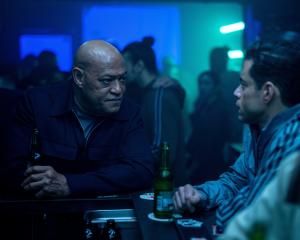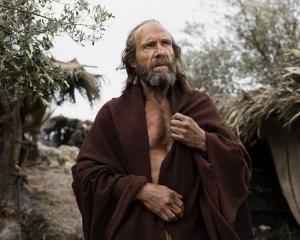Yet her latest project, film The Insatiable Moon, has provided her with challenges both personal and professional.
The metamorphosis of her husband Mike's 1997 novel into a film of the same name has been an exercise in patience.
It also reflects the passion required to steer an initial vision beyond some substantial financial hurdles, notably the New Zealand Film Commission's decision last year not to support the producers' application for a significant grant (originally, the film's budget was around $6 million), a move which prompted the collapse of other funding streams.
All the more satisfying then that the world premiere of The Insatiable Moon should attract a full house at the New Zealand International Film Festival at Sky City Theatre on July 17 - the first show in the festival to sell out.
"There were about 700 people and we got a standing ovation.
The Insatiable Moon stars Rawiri Paratene (Whale Rider) as Arthur, a psychiatric patient with intriguing insights into the human condition.
Self-proclaimed second son of God, the man brings wonder and hope to his urban life, accompanied by a group of friends, including alcoholic Norm (played by Ian Mune), foul-mouthed boarding-house manager Bob (Greg Johnson) and fragile community worker Margaret (Sara Wiseman), who falls for the charismatic Arthur.
Arthur sees a chance to prove his heavenly credentials when real-estate developers threaten to close his boarding house and he preaches a vision of a just and caring society before his psychiatric maladies grow stronger, prompting doctors to sedate him, a course of action that ultimately kills him.
"The book was set in a time when mental health institutions were being closed down and people were being relocated into the community," Riddell explains.
"It's not a pitying look at them. This is who they are.
"They have some extraordinary wisdom within their disabilities.
"I don't want it to be seen as a film of various lessons or morals people can learn.
"It is entertainment, with a twist.
"For me, the film's themes include a strong sense of redemption and of hope.
"Another thing - and this is something I see in my job as a judge - is that there is a very strong public backlash about sentencing, that throw-away-the-key mentality.
"In the film, we explore one of the most unpalatable aspects of human life, the convicted paedophile.
"I think the film challenges people in a way films rarely do and does it in a compassionate yet stern way.
"I love the fact that it is a film that can take you from laugh-out-loud to tears within a short space of time.
"I think tackling such serious issues in a way where people can laugh is one of the strengths of the film.
"Some see it as a film about mental health; some see as an exploration of theological reflections.
"People can go to the film and take from it what they like."
Riddell began her working life with the former New Zealand Broadcasting Corporation before becoming a professional actor at Downstage and subsequently spending a year touring schools with the New Zealand Drama Quartet.
She then studied law, graduating in 1992.
In 1997, the couple moved from Auckland to Dunedin. Riddell describes the move as "the best thing we did - it was a new chapter in our lives".
While Mike took up writing full-time, Riddell progressed through the ranks of a Dunedin law firm, becoming a partner and practising family law before becoming a district court judge in 2006.
"That's why we had to leave and head to Hamilton.
"My job is here and we now live in Cambridge."
She continued her interest in the creative sector during her law career, writing, producing and directing.
In 2002-2003, Riddell directed Jerusalem, Jerusalem.
Written by her husband and based on the life of James K Baxter, it played at the Edinburgh Fringe Festival and elsewhere in the United Kingdom.
In 2005, she directed the short film Cake Tin, made in Dunedin, which won the Sandcastle Award for Best Short Film at the Moondance Festival in Hollywood.
She always thought Mike's novel would make a strong movie.
"He would pass me each chapter as he wrote it and I was thinking, 'this is a film'. But it took until 2002 for him to turn it into a script."
That year, the writer also received a letter from Paratene, notable for his portrayal of an overbearing Maori patriarch in Whale Rider.
"He said, 'Look, I've just read the book; I love it and would like to have a go at doing the screenplay'," Riddell explains. "Mike said, 'Well, I've beaten you to it; I've sold the rights to a British company'.
"To which Rawiri replied: 'Right, I'm playing Arthur'."
Paratene remained committed to the project, though others, including British director Gillies MacKinnon, a keen supporter, withdrew on hearing of the New Zealand Film Commission's decision not to fund the film.
"At that point Gillies said, 'Well, you can't make a film for under a million', so he walked."
Others did, too, including leading British actors James Nesbitt and Timothy Spall.
"We did wonder whether we should just pull the plug on the project but I think we'd reached the point where we had been through development hell for so many years - and we did have some money from private investors - that we decided to go ahead with what we had.
"So we made the film for $340,000, which is pretty unusual in film circles," Riddell says.
At that time, the film's producers asked Riddell to direct it.
Initially horrified at the prospect, she realised she knew the story intimately.
"I picked myself up and we went from there. Having a cinematographer with 30 years experience [Thomas Burstyn] certainly helped.
"The script was really locked in by the stage I came in as director. Some things did change towards the end, a few scenes, but there was no great slashing involved.
"When I was auditioning the cast, there was still the belief it might still be a $6 million film with a British director.
"But they didn't pull out when they knew it was an unknown directing, because everyone who auditioned was blown away by the script.
"It gives actors the opportunity to shine and show what they are capable of.
"The atmosphere on set was contagious.
"We were filming for a week in a boarding house and some of the real characters were wandering around."
Still, the project has had its costs: Riddell had to take accumulated leave in order to shoot the film, after which she developed shingles and had to take a further two months off work.
"I didn't think I was stressed but I clearly was ... my body had said enough is enough."
Yet she insists she is up for a new challenge.
"Mike has three projects he is working on right now. I have another idea and am shooting a pilot early next year. Having whetted my appetite, I think I'm ready for more."
• The Insatiable Moon opens nationwide on Thursday.












